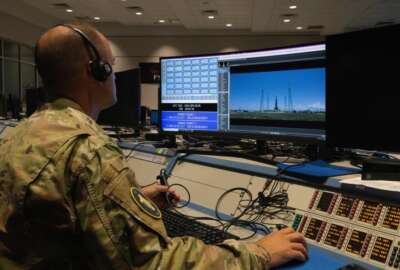Congress made hiring a civilian workforce with an expertise in cybersecurity a top priority in the 2023 National Defense Authorization Act. In addition to recruiting a cyber workforce, the Defense Department will set up a program to bring in new talent by educating them.
The department will expand its funding of university-level cyber education. Under a program called the Department of Defense Cyber and Digital Service Academy, DoD will provide scholarships through institutions of higher education to students who take courses of study related to cybersecurity.
The cyber academy will pay education expenses for no more than five years in return for a commitment to work in a DoD civilian position focused on cyber or digital technology for the same amount of time.
The NDAA gives the secretary of defense some latitude to flesh out details of the program, but requires that that academy “pay all educational expenses incurred by that person, including tuition, fees, cost of books and laboratory expenses, for the pursuit of the program of education for which the assistance is provided and also provide a stipend for room and board.”
Academy students will also have funding available to participate in internships while they are earning their degree, and the DoD employment commitment at the end of the student’s education will be equal to the length of the time spent on education counted as ending when the student receives a degree or program certificate.
To be eligible for the program, the student would have to be a U.S. citizen, be going to school full-time and have demonstrated abilities and interests in pursuing a career in national cybersecurity awareness. Students failing to complete their service commitments will have to reimburse the government for the costs of their education.
DoD will also be looking for a few universities to act in an advisory role. The NDAA outlines a plan for establishing a consortium of universities that will advise the secretary of defense on cybersecurity matters.
The consortium will include one or two universities that “have been designated as centers of academic excellence by the director of the National Security Agency or the secretary of homeland security and are eligible for access to classified information,” said the NDAA.
In addition to developing a new cyber workforce by offering educational opportunities, this year’s NDAA continues to explore the topic of a potential civilian cyber reserve workforce.
The bill directs the secretary of defense to hire a non-profit or federally-funded research firm to look at organizing a permanent cyber reserve force. Congress requested DoD go to a third party for the study after the Defense Department failed to produce a study when it was requested in the 2021 NDAA. Congress also restricted funding available to the principal cyber advisor until the report is submitted.
The NDAA authorizes the research firm to “conduct an assessment of the feasibility and advisability of creating and maintaining a civilian cybersecurity reserve corps.” Congress envisions that force potentially being called up for up to 365 days, and being available to also assist other agencies on an as-needed basis.
The reservists would “provide qualified civilian manpower to the Department of Defense to effectively respond to significant cyber incidents or to assist in solving other exceptionally difficult cyber workforce-related challenges,” according to the NDAA.
The law lists specific issues that it wants the report to address. The primary focus would be on making sure enough people with the appropriate skill set would be interested in serving in a reserve force. The report is also supposed to address the likelihood of using a civilian force to augment the DoD’s existing cyber workforce, and ways of identifying and recruiting future reservists. The issue of security clearances and handling of classified information would also have to be addressed.
In an effort to compete with private companies, DoD has the ability to provide extra pay for civilian cybersecurity employees through the Cyber Excepted Service. Congress wants DoD to deliver a review of the program within six months. In an effort to expand cyber excepted service’s use as a recruiting tool, the review needs to address the barriers to participation in the program and criteria for eligibility. The goal for the review would be fine-tuning the program to attract more employees with cyber capabilities.
Congress wants to see an analysis of “matters relating to pay disparity and challenges with compensation relative to the skill sets and value of such civilian employees in the private sector,” said the NDAA.
The report should make a conclusion for how current efforts to use the program are integrated into the strategic workforce planning for the department.
Copyright
© 2024 Federal News Network. All rights reserved. This website is not intended for users located within the European Economic Area.


